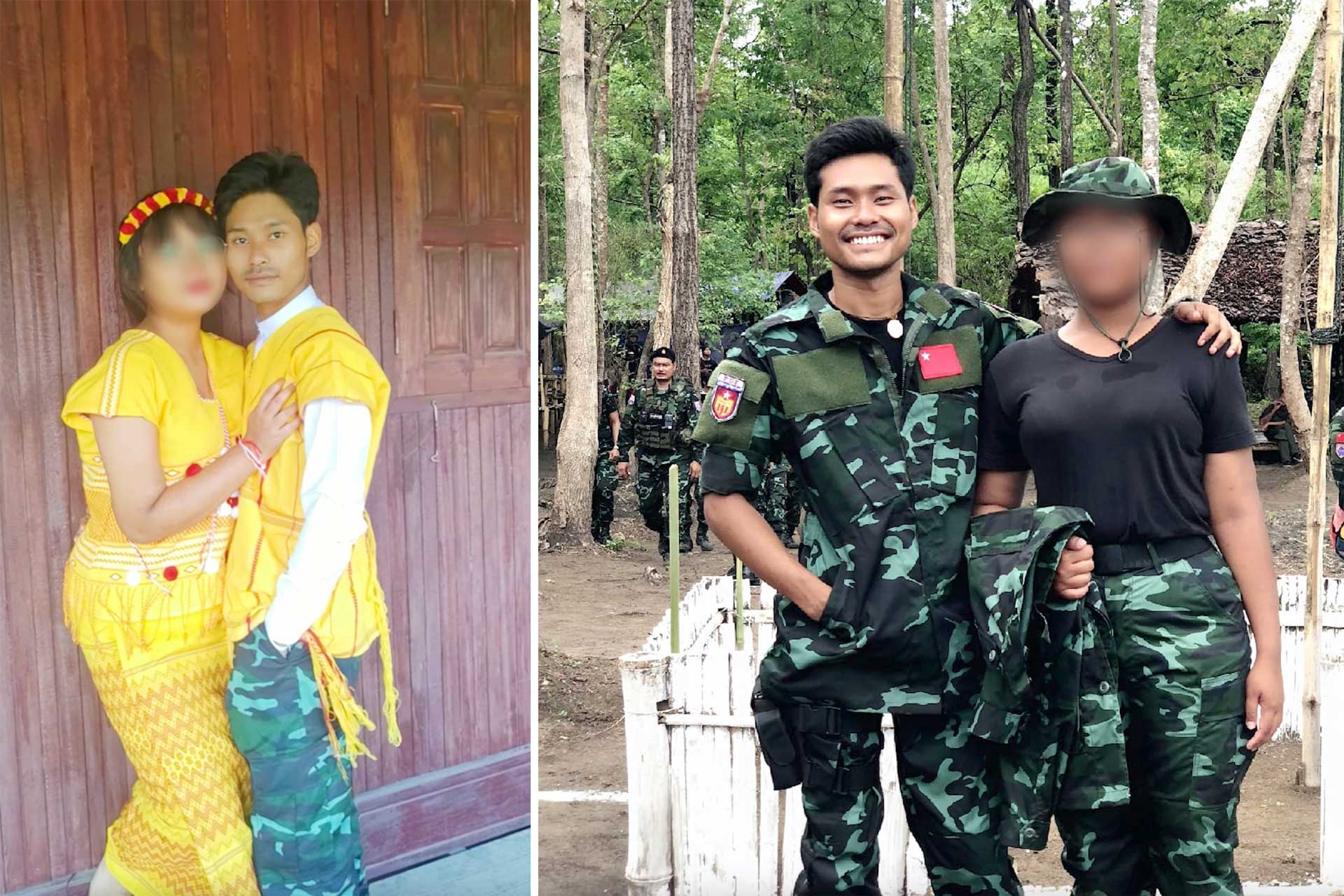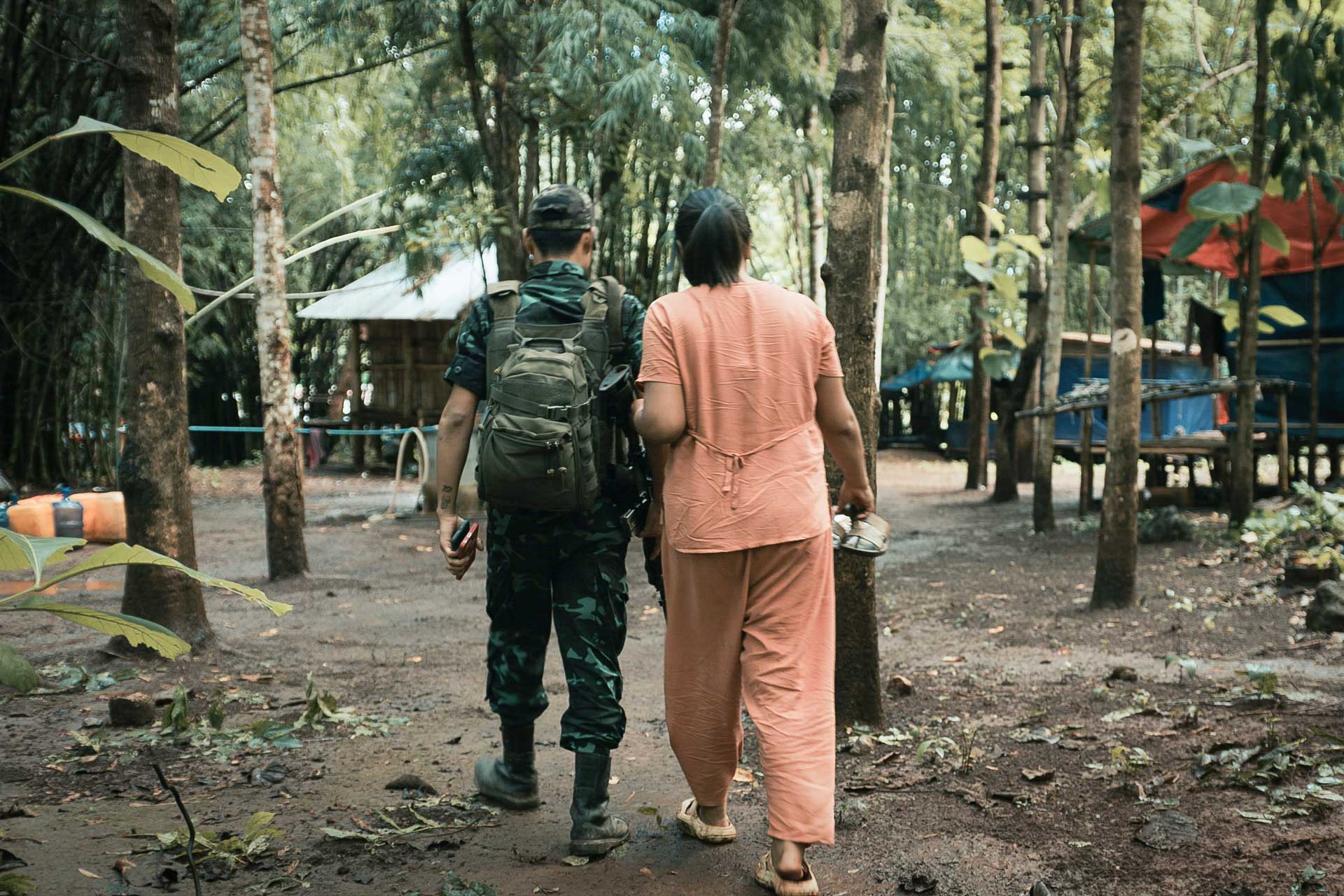A new generation in Myanmar’s civil war
A new generation in Myanmar’s civil war
In a dingy hut in a rebel camp not far from hundreds of Myanmar military soldiers trying to kill them, Barli and Owl await their first child.
Their place is small – the kitchen in her house back home in Rakhine state was bigger, Owl says. But it has its advantages. Canvas walls keep the rain out, and there’s an adjacent bomb shelter that Owl can crawl into when she hears gunfire or military planes overhead. It’s a tighter fit by the week, but she isn’t one to complain.
“Other people – unmarried male and female soldiers – have to sleep in the forests with army hammocks,” she said. “I do not worry too much about my pregnancy because I know our comrades here help each other a lot. So, I’m not afraid.”
Barli, in the crisp forest green camouflage of his command’s uniform, is equally determined: “There is anxiety, but I am committed to doing my best. The baby has come to us for a reason, and I will strive to raise it well.”
Both of their names have been changed to protect their families from retribution.

Owl’s and Barli’s lives are nothing either could have foreseen when they were young students in love.
Owl was preparing to be a nurse, and Barli was taking courses online and living near Yangon, Myanmar’s commercial capital, when the military began arresting members of the civilian administration in a February 2021 coup.
The civil war that followed has killed at least 50,000, displaced more than 3 million, and caused countless other miseries. Barli and Owl’s generation grew up in a freer Myanmar and didn’t like the prospect of a return to the restricted living of military rule, which is how they found themselves in rebellion and starting a family surrounded by mosquitos and mud.
The physical discomforts are manageable. For Owl in particular, it is the separation from her mother as she prepares to become one herself that affects her the most. Angered by Owl’s decision, she publicly denounced her daughter in a local newspaper and has cut off communication.
“Whenever I call, she hangs up as soon as she hears my voice,” Owl said.
Their fracture reflects broader tensions between old traditions and loyalties and new freedoms and independence repeated thousands of times across Myanmar during a civil war that shows no sign of ending.
The coup and its aftermath
After the coup, Barli, fueled by anger and frustration, took to the streets in protest, his three fingers raised in the air in a symbol demonstrators took from the Hunger Games.
He was part of a March 3, 2021, demonstration in Kanthayar ward of North Okkalapa, a township in northern Yangon, where government forces fired into the crowd. He said some of his closest friends were killed or wounded.
He resolved to take up arms and joined the Generation X, Y, Z Defense Force, a new militia formed to challenge the military. He is now a member of the Black Panther Column under the National Unity Government, or NUG, an administration in exile made up of former members of the ousted National League for Democracy party.
Here, the NUG is aligned with and helped by the Karen National Union, a group of ethnic Karen that has for decades fought with the Myanmar military for greater independence.
The pairing, supporters say, bodes well for the type of pluralistic society they want to build if the military falters. But stitching together Myanmar’s various constituencies in a federal system will be difficult, even if the military falters.
Barli’s unit serves alongside the Karen National Union forces in an area in eastern Myanmar known as Brigade 6. The Karen have helped train more inexperienced soldiers like Barli who joined revolutionary militias known as People’s Defense Forces after the coup.
Cobra Column train inexperienced soldiers who joined revolutionary militias known as People’s Defense Forces after the coup. (Cobra Column video)
A reunion in the jungle
Initially, family responsibilities kept Owl from joining him. After graduating as a nurse, she went to Singapore to help support her mother and two younger sisters. Her father, who was a sergeant in the military, had died and the family needed the income she could provide.
Owl and Barli were separated from one another for more than a year. She returned to Myanmar in late 2022 for what was to be a quick visit. But it was then she learned that Barli’s shoulder and hand had been injured in a gun battle. He sent word that he was desperate to see her.
“He was in the hospital after injuring his hand in the fight, and I just really wanted to see him,” she said. “That’s why I decided to come to the forest for a while to find him.”
Reunited, the two eventually married in a small jungle ceremony surrounded by fellow soldiers. Although both are from Rakhine state in Myanmar’s west, they dressed in traditional Karen yellow out of respect for their hosts.
That was more than a year ago, and Barli is still recovering from his injury. He’s due for another surgery soon.
Barli has taken on a support role away from the front lines as he recuperates. But here there’s danger everywhere, from bombs dropped by jets, to armed aerial drones to landmines scattered everywhere military troops have ventured.

Determined, but prepared for the worst
RFA visited the couple during the rainy season, a hard time to live in a jungle but a time of relative safety as aerial bombings tail off during these cloudy months. When the skies are clear, the unit has to move frequently to make it more difficult for military forces to track them.
“I have already arrived here, and since I have resolved to serve the people, my life is already dedicated to them,” Barli said. “I am prepared to face death at any moment, and it does not trouble me.”
Owl is equally resolved in the cause but the shadows cast over her face by the canvas walls of her hut can’t quite conceal her sadness at the split with her mother.
After a friend was arrested trying to visit her family, Owl is too scared to risk an in-person visit. And her mother refuses to take her calls.
“As the eldest daughter, I know she had high expectations of me, and she must be deeply disappointed by my actions, compounded by the absence of my late father,” she said.
She doesn’t regret her decision, even though she does not anticipate the conflict ending anytime soon. She is, however, already looking to a time of reconciliation.
“What I desire most is to apologize to my mother,” she said. “I hope to do so with my child, or with the baby still in my womb, holding my husband’s hand and offering my respect to her once the revolution is over.”